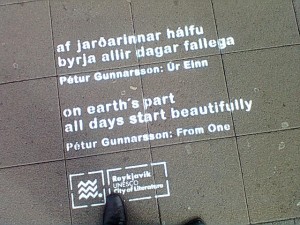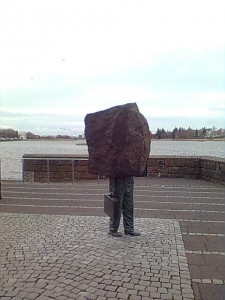Learning Icelandic vs. speaking Icelandic Posted by hulda on Jan 8, 2014 in Icelandic culture
 Hello again and welcome to the year 2014 with the Icelandic blog and Hulda! For January there’ll be a theme again, and this time it’ll be… dun dun duuunnn… practical learning; Icelandic in the daily life of a language-learner. I will be aiming for installing just a little bit of Icelandic language into your daily lives, hopefully in as pleasant a way as possible. No grammar will be requested of you, there won’t be any homework aside of that which you actively want to do. As one part of this I will be introducing you some of my favourite Icelandic bands because, as I like to say, listening (and singing along) to Icelandic music is the best way of learning without even noticing that it’s happening. If it proves popular, who knows, maybe I’ll include it as a permanent topic – a new band/artistic feature a week!
Hello again and welcome to the year 2014 with the Icelandic blog and Hulda! For January there’ll be a theme again, and this time it’ll be… dun dun duuunnn… practical learning; Icelandic in the daily life of a language-learner. I will be aiming for installing just a little bit of Icelandic language into your daily lives, hopefully in as pleasant a way as possible. No grammar will be requested of you, there won’t be any homework aside of that which you actively want to do. As one part of this I will be introducing you some of my favourite Icelandic bands because, as I like to say, listening (and singing along) to Icelandic music is the best way of learning without even noticing that it’s happening. If it proves popular, who knows, maybe I’ll include it as a permanent topic – a new band/artistic feature a week!
Today I’d first like to tell you about my own failures concerning learning the language though, and what I’ve learned from them.
A Finnish chick at the Helsinki-Vantaa airport, ready for takeoff.
Three and a half years ago as I moved here and began my studies at the university I thought that pronunciation would be the last of my worries. It’s generally a strong point for me in language learning, plus I could already easily understand the Icelanders as they spoke so it didn’t take half as long to train my ear to Icelandic than f.ex. French. This may have been my biggest mistake, which is why I’ll be using spoken language & pronunciation as my example in this post.
The first year in the uni I still thought I was doing well but reality began to hit more and more often when I used the language outside of it. It’s a sad fact that while the university professors have trained their ear to understand all kinds of accents the world outside is an entirely different place where the only thing I really had going for me was the one thing I always thought of as my weakest point: I speak slowly because of the dialect I use in my mother tongue. While Finnish in general is often spoken slowly this particular dialect from middle Finland is considered a sluggish one even within the country so just imagine how I sound like in languages that are typically spoken fast… yes, I’ll bore you before I get one sentence out. However, sometimes your weaknesses can be turned to strengths. It took me a while and much embarrassment but in the end I realized that speaking slowly had its merits. No one Ha?-ed me, most times I managed to explain myself well enough to communicate my main point, even that one time when I was questioned by the police (I was on a bus that had an accident and they interviewed every passenger on board). I’m 100% certain the Icelandic police speak fluent English but I took it as a really good sign that they never even attempted to switch to it during the whole time.
By now I think I can tell what the biggest dangers were (on account of meeting every one of them face-first, as sadly is my typical approach to all the problems I encounter):
– Overconfidence
– Lack of knowledge
– Assumptions
Overconfidence happens when you think you can handle something easily, just as happened with me and pronunciation. I looked at an Icelandic text and thought I knew how to read it out loud. The only tricky parts, so I thought, were probably going to be the difficult sounds, else there’d be no trouble what so ever. This kind of overconfidence can even be furthered by hearing an Icelander read the text out loud, because you’ll be thinking: “Of course, that’s exactly as I imagined it would sound like” and boy, that could not be further from the truth.
What I couldn’t hear during my first year is in the rhythm and aspiration, the subtle differences in the lengths of vowels, the sounds wedged in or dropped off and the aspirations appearing at seemingly random – I assume this is a typical problem for a foreigner learning Icelandic. Yet just because you don’t hear them doesn’t mean they aren’t there, and that they aren’t massively important. Failing to create the same sounds will make it very difficult for Icelanders to understand you because they will definitely hear the extra sounds, or lack thereof, and if they’re not university professor level at understanding foreign accents they’ll be struggling just as much to understand you as you are to explain yourself.
With time your view is going to widen on its own – no need to rush it.
Lack of knowledge is also easily explained: a new student of Icelandic cannot know and will not be expected to know all the rules of pronunciation. That would be like expecting a new student of Chinese to instinctively know the differences that intonation makes. This part you’ll be building slowly, brick by brick, while you learn the theory of pronunciation and yet when you go out of the door and chat with your friends… they’ll ignore all those rules you’ve just learned and speak in any way they happen to. They may be wedging in English words, use dialects (there actually are a few dialects in Iceland although the common belief is that there are none), shorten words whichever way they feel like doing and so forth. You in turn have no such option or you risk them not understanding you at all.
Therefore don’t try too hard to sound like a native and instead strive to learn the rules as you go. Speak clearly, even if you’re not certain of the grammar/vocabulary. As long as your Icelandic is understandable your conversation partner will likely help you out with the rest.
We all know this feeling, right?
Assumptions are related to overconfidence but in many ways they differ greatly. Assumptions can often be negative, causing you to create false expectations of yourself or judge a situation falsely. Most language learners know what I’m talking about I’m sure, especially those that have tried their language skills in a foreign country and have received a reaction they perceive as negative, and then build a whole castle of linguistical uncertainty and self loathing over that one situation that may not actually have been as bad as it felt like in the first place.
What I’m talking about is people’s reactions to you attempting to use their language followed by your own reactions to them. Almost every single time the native speakers’ reactions that seem negative are actually just panic reactions to a situation where communication has suddenly become uncertain. Just imagine being unable to know how the other person will understand you, you’re not sure if you’re understanding them correctly, what if you’re actually doing something really insulting right now and are upsetting them… yes, all feelings that you may often have as a foreigner trying to use the language, right? Well, what if the other side is feeling exactly the same?
The Icelandic panic reaction shows in two ways: either by a forced smile or a complete lack of any kind of emotion, coupled often by frowns and odd twitches. You’re not actually being looked-down upon though, most likely the person you’re talking to is putting up so much energy in listening and panicking that very little conscious effort is put anywhere else. The toothy grin is just a desperate attempt to keep a friendly countenance (everyone likes a smile, a smile is not threatening, maybe if I’ll smile a bit more they’ll relax and know I’m not mocking them, owww my face is starting to hurt, must… smile… wider…) and interestingly, so is the stoic, no-emotions what so ever (I better not smile or they’ll think I’m not taking them seriously).
Add the frowns that look quizzical, lack of politeness in speech and a reply that sounds more like a bark and yeah, it will feel intimidating to say the least. Remember though that Icelandic has a stern tone to it. It’s a language that by default sounds angry at the world in general and everything in it, which trickles into other languages just like my middle-Finnish slowness makes its way to every single other language I speak. It’s not that your conversation partner hates you, it’s simply their natural way of speaking.
Of the three problems assumptions are probably the most difficult to battle, but battle them you must. Stay calm and carry on, always remember to stop yourself if you’re heading down the “I’m such an incompetent moron” train of thought. You’re not, or if you are then so are we all and you’re not alone! So just keep repeating to yourself Þetta reddast (= things will sort themselves out) and you’ll see, usually they always will.
***
Mugison is probably not a stranger to the most of you, but let’s start with him regardless because simply put Mugison is amazing. He writes songs in both Icelandic and English and his music style is hard to pinpoint because it varies so much, yet I’ve not heard a song by him that I would not have loved. With a long career already under his belt he’s also the starting force behind the now 10 years old summer festival Aldrei Fór ég Suður (= I never went south/to Reykjavík, a saying from the Vestfjörður area)(link). The rules for the bands? You won’t be paid for playing, no backstage, no soundchecks. It costs nothing to attend this festival so in case you’re around in Iceland when it’s on, do consider!
Here’s some songs by him that I’ll never get tired of:
Mugiboogie (link) (English)
Haglél (link) (Icelandic) Warning: gory image of an armless, legless man.
Stingum af (link) (Icelandic) With lyrics!
Gúanó stelpan (link) Live version.
All the photos of this blog post are by Snu, whose photographs can be found in The Secret Life of Phone (link). The blog gets its name from the fact that all the photos of interesting, quirky and unusual things he comes upon by either chance or accident are taken with phone cameras! Thank you for allowing me to use these photos!

Build vocabulary, practice pronunciation, and more with Transparent Language Online. Available anytime, anywhere, on any device.
About the Author: hulda
Hi, I'm Hulda, originally Finnish but now living in the suburbs of Reykjavík. I'm here to help you in any way I can if you're considering learning Icelandic. Nice to meet you!










Comments:
Kayla:
Hi,
I really enjoyed reading this and I was just wondering if you could help me with a simple translation. I am planning on making a poster thing for my sister since we are partly viking. Anyways, I want it to say “be better” in Icelandic but I’m not sure I trust google’s translation. I was just wondering if you could give me a translation for that? Thanks either way!
Thanks,
Kayla
hulda:
@Kayla Hmm… some context would help, because Icelandic has a few options to how “be better” could translate. If we’re not talking about a “get well” greeting some options would be:
– að vera betri – this is a very simple translation, word to word, and means “to be better”: however, if you want the text to address another person you should rather use
– vertu betri – this is a wish or a reminder that the other person would become better at something. However, as a sentence it sounds a little confusing in Icelandic and Icelanders would add something to it to define in what, exactly, should the person become better at.
Irene:
Anybody plz, can translate the lyrics of Stingum af inti english? So beautiful song!!! Love it.Or give any link where I could find it?